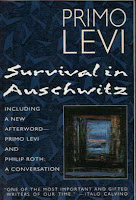Survival in Auschwitz - Primo Levi
 Title: Survival in Auschwitz/If This is A Man
Title: Survival in Auschwitz/If This is A Man
Author: Primo Levi
Country: Italy
Year: 1958
Rating: B+
Pages: 187pgs.
First sentence: It was my good fortune to be deported to Auschwitz only in 1944, that is, after the German Government had decided, owing to the growing scarcity of labour, to lengthen the average life-span of the prisoners destined for elimination; it conceded noticeable improvements in the camp routine and temporarily suspended killings at the whim of individuals.
Almost everyone has read a story about the Holocaust. It is a historical event that should never be forgotten. While genocide continues to exist, the Holocaust should be recalled and mistakes remembered, to help save those mired in present conflicts, such as the Emergency crisis in Darfur, and warnings in Zimbabwe, Burma, and Uzbekistan.
Reading memoirs by Holocaust survivors can be a horrifying, emotive experience. In some ways Survival in Auschwitz fits that description, as the sheer improbability of a person's survival in Auschwitz, where Primo Levi was in residence for ten months prior to liberation, is a horror in and of itself.
Yet, Levi takes a different approach. His story is clearly told through the eyes of someone rooted firmly in the sciences: it is clear, analytical, and precise. He writes almost in the way of an outside observer, rather than someone who has lived in those heart-wrenching conditions. He describes daily life from an anthropological viewpoint: the layout of Buna's camp, the division of living quarters, rules and schedule of the camp, the detailed process of gaining admission to Ka-Be, the infirmary. You learn that the numbers tattooed on those interred at Auschwitz tell much about the science of the camp and reveal who did and did not survive. For example, those who were tattooed with numbers 30,000-80,000 were transferred from the Polish ghettoes; only a few hundred survived.
Yet, scattered seamlessly throughout, are the snippets of personal passages that can not be ignored. On returning to work after the lunch break on a blustery day he recalls 'Oh, if only one could cry! Oh, if one could only affront the wind as we once used to, on equal terms, and not as we do here, like cringing dogs.' (p. 70) In the hours preceeding his relocation to Auschwitz, Levi recalls, 'many things were then said and done among us; but of these it is better that there retain no memory.' (p. 15) Levi's approach is one not taken by many. Because of this, it is definitely a story that needs to be read.
The Auschwitz refrain to newcomers:
'You are not at home, this is not a sanatorium, the only exit is by way of the Chimney.' (p.29)
A new purpose:
'The conviction that life has a purpose is rooted in every fibre of man, it is a property of the human substance. Free men give many names to this purpose, and think and talk a lot about its nature. But for us the question is simpler. Today, in this place, our only purpose is to reach the spring.' (p. 71)
Dreading the arrival of winter:
'We fought with all our strength to prevent the arrival of winter...We know what it means because we were here last winter; and the others will soon learn. It means that in the course of these months, from October till April, seven out of ten of us will die. Whoever does not die will suffer minute by minute, all day, every day.' (p. 123)
A memory of those who drowned; who did not survive:
'They crowd my memory with their faceless presences, and if I could enclose all the evil of our time in one image, I would choose this image which is familiar to me: an emaciated man, with head dropped and shoulders curved, on whose face and in whose eyes not a trace of a thought is to be seen.' (p.90)


7 comments:
I have read quite a bit about the Holocaust and am always interested in reading something a little different from the rest. And yet each story is different in its own way even then. I will definitely be adding this one to my wish list. It sounds interesting.
I think this sounds interesting, too, although very sad.
Excellent review. I don't think Auschwitz is something I could stand to read about, at the moment, but I'll add this one to my list for the future.
@literary feline - I have been reading one Holocaust book each year. Last year it was Night by Elie Wiesel which remains my favorite.
@joy - you're right...it's not quite a pick-me-up kind of book!
@bookfool - it can be hard. My MIL has never picked up a Holocaust book in her entire life. It's understandable: her mother arrived in the US from Poland right before Nazi occupation, and most of the family remaining in Poland perished in the camps.
Thank you for the review nyssaneala, I might have to pick it up before our trip to Auschwitz (we leave next week). Currently, I have set aside Elie Wiesel's "Night" and Mary Berg's memoir about growing up in a Warsaw ghetto.
Thank you for all the wonderful quotes and passages you included.
'Oh, if only one could cry! Oh, if one could only affront the wind as we once used to, on equal terms, and not as we do here, like cringing dogs.' (p. 70)
This one in particular made me tear up.
I would suggest reading Levi's book on the airplane, and Elie Wiesel's Night while you are there. Elie's book remains my favorite, but be prepared: I cried through most of it.
You'll have to let me know how Mary Berg's book is. I haven't heard of that one. Enjoy your trip!!
Thanks, nyssaneala!
Will definitely let you know about the Mary Berg memoir. Going to try to get my hands on Levi's book before I leave.
Post a Comment